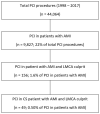Clinical Outcomes after Percutaneous Coronary Intervention for Cardiogenic Shock Secondary to Total Occlusive Unprotected Left Main Coronary Artery Lesion-Related Acute Myocardial Infarction
- PMID: 36835846
- PMCID: PMC9959397
- DOI: 10.3390/jcm12041311
Clinical Outcomes after Percutaneous Coronary Intervention for Cardiogenic Shock Secondary to Total Occlusive Unprotected Left Main Coronary Artery Lesion-Related Acute Myocardial Infarction
Abstract
Background: Acute myocardial infarction (AMI) with occlusion of an unprotected left main coronary artery (ULMCA) is a rare condition with a high mortality. The literature on clinical outcomes after percutaneous coronary intervention (PCI) for cardiogenic shock secondary to ULMCA-related AMI is scarce.
Methods: In this retrospective analysis, all consecutive patients undergoing PCI for cardiogenic shock secondary to total occlusive ULMCA-related AMI were included between January 1998 and January 2017. The primary endpoint was 30-day mortality. The secondary endpoints were long-term mortality and 30-day and long-term major adverse cardiovascular and cerebrovascular events. The differences in clinical and procedural variables were assessed. A multivariable model was created to search for independent predictors of survival.
Results: Forty-nine patients were included, and the mean age was 62 ± 11 years. The majority of patients suffered cardiac arrest prior or during PCI (51%). Thirty-day mortality was 78%, of which 55% died within 24 h. The median follow-up of patients who survived 30 days (n = 11) was 9.9 years (interquartile range 4.7-13.6), and long-term mortality was 84%. Long-term all-cause mortality was independently associated with cardiac arrest prior or during PCI (hazard ratio [HR] 2.02, 95% confidence interval 1.02-4.01, p = 0.043). Patients who survived to the 30-day follow-up with severe left ventricular dysfunction had a significantly higher risk of mortality compared to patients with moderate to mild dysfunction (p = 0.007).
Conclusions: Cardiogenic shock secondary to total occlusive ULMCA-related AMI carries a very high 30-day all-cause mortality. Thirty-day survivors with a severe left ventricular dysfunction have a poor long-term prognosis.
Keywords: acute myocardial infarction; cardiogenic shock; left main coronary artery; mortality; percutaneous coronary intervention; total occlusion.
Conflict of interest statement
The authors declare no conflict of interest.
Figures
References
-
- Patel N., De Maria G.L., Kassimis G., Rahimi K., Bennett D., Ludman P., Banning A.P. Outcomes after Emergency Percutaneous Coronary Intervention in Patients with Unprotected Left Main Stem Occlusion: The BCIS National Audit of Percutaneous Coronary Intervention 6-Year Experience. JACC Cardiovasc. Interv. 2014;7:969–980. doi: 10.1016/j.jcin.2014.04.011. - DOI - PubMed
-
- Pappalardo A., Mamas M.A., Imola F., Ramazzotti V., Manzoli A., Prati F., El-Omar M. Percutaneous Coronary Intervention of Unprotected Left Main Coronary Artery Disease as Culprit Lesion in Patients with Acute Myocardial Infarction. JACC Cardiovasc. Interv. 2011;4:618–626. doi: 10.1016/j.jcin.2011.02.016. - DOI - PubMed
-
- De Luca G., Suryapranata H., Thomas K., van’t Hof A.W.J., de Boer M.J., Hoorntje J.C.A., Zijlstra F. Outcome in Patients Treated with Primary Angioplasty for Acute Myocardial Infarction Due to Left Main Coronary Artery Occlusion. Am. J. Cardiol. 2003;91:235–238. doi: 10.1016/S0002-9149(02)03115-6. - DOI - PubMed
-
- Tang H.C., Wong A., Wong P., Chua T.S.J., Koh T.H., Lim S.T. Clinical Features and Outcome of Emergency Percutaneous Intervention of Left Main Coronary Artery Occlusion in Acute Myocardial Infarction. Singap. Med. J. 2007;48:1122–1124. - PubMed
LinkOut - more resources
Full Text Sources
Miscellaneous




